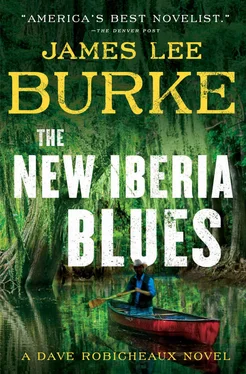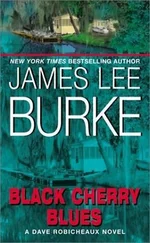“That was Wexler?” Bailey said.
“Yes,” I replied.
“What did he say?”
“That except for shooting Wimple, he’s an innocent man.”
“Do you believe him?”
“Did you know him in New Orleans?”
“No.”
“Never saw him before you came to the Iberia Sheriff’s Department.”
“No. Is that what he told you?”
“We need to get a net over Desmond Cormier,” I said.
“Cormier has Alafair?”
“I’m not sure about anything.”
She looked at me in dismay. I walked toward my truck. I have long had problems with vertigo, the kind caused by a tightening of blood vessels in the brain. I could feel the ground caving under my feet. Then I felt Clete fitting his hand inside my upper arm. He opened the driver’s door and steadied me so I could step inside.
“I’m all right,” I said.
“What did that cocksucker say?”
“He knows things about Bailey that would be impossible for him to know, unless he’d had a relationship with her. He says the stuff from the attic are movie props. He knows nothing about a tarot deck.”
“What else?”
“Alafair may already be dead. Or maybe Cormier has her. I just don’t know.”
“Don’t say that about her being dead. You hear me, Streak? Don’t even think it. I’m going to get these guys. I promise you.”
He looked like he was drowning.
Bailey and our departmental pilot and I took the pontoon plane over the wetlands south of New Iberia. It might have seemed a waste of time to others, but we had nothing else to go on. I had no idea where Desmond Cormier might be. Wexler knew Bailey’s history, which gave plausibility to the other things he’d said. Possibly he had worked as a companion killer with Desmond. That I’ve spoken of Desmond’s physiognomy several times probably says more about me than Desmond. The prenatal alcoholic influence stamped on his features was undeniable, the inner reality one I had never wanted to accept.
As the plane dipped and turned and glided over the swamps and marshlands that were shrinking daily, I wondered what to look for. Maybe a white cabin cruiser couched in a green harbor. A cherry-red Lamborghini. A houseboat or a duck camp where Alafair had set a fire as a mayday signal. These thoughts were the product of desperation, and they led me to worse thoughts, namely, that I might see Alafair costumed and floating out to sea, closing the circle for the killer, as Bailey had predicted.
I had thought my days in the Garden of Gethsemane were over and my ticket had been punched, and that I belonged to the club of those who were inured to the worst the world could offer. But as I looked at the miles and miles of salt grass and flooded gum trees and milky-green curtains of algae that floated atop the bays, I knew that I was powerless over my situation, and the last remnant of my family had perhaps been subsumed by the evil forces I have fought against all my life, most of it in vain.
What does the expression “hell on earth” mean? In my experience, it usually has to do with our own handiwork. Freight cars clicking down the tracks on their way to Buchenwald. A nineteen-year-old peasant girl set alight while tied to a stake in Rouen, France. The slaughter of fifty million buffalo to starve the American Indian into submission.
Or a child who survived a massacre in an El Salvadoran village and grew into an attorney and a novelist, only to be kidnapped by a fellow countryman and perhaps locked in a car trunk, hog-tied, eyes and mouth wrapped with tape. That image lived like a scream inside my head.
We landed off Cypremort Point and taxied across the water to a dock where Clete Purcel was waiting for us. He was wearing a windbreaker and khakis and lace-up canvas-and-rubber hunting boots, his hair blowing in the wind. He looked at Bailey, then back at me. “I got a tip.”
I waited, the wind cupping in my ears.
“From the black gal who was chugging pole for Wexler when he popped Wimple in City Park,” he said.
“We don’t need the detail,” Bailey said.
“Do you want to hear me out or not?” he replied.
“What did she say?” Bailey asked.
“She turns tricks out of a couple of motels in Lafayette,” he said. “She does specialties for geeks. She says Wexler is a regular. She had dinner one time with Cormier.”
“Dinner?” I said.
“Yeah, she knows him pretty good. She says he’s weird.”
“What does she know about Alafair?” I said.
“I’m trying to get to that,” he said. “She says Wexler and Cormier brought her to a duck camp. Cormier went off on his own while she took care of Wexler. She says Wexler told her there were drowned Nazi sailors about half a mile from shore. She thought he was making fun of her.” He kept his eyes on me.
“You know a place like that?” Bailey said.
“I’m not sure,” Clete replied.
I knew exactly where the place was, and so did Clete. In the early days of World War II, German U-boats lay in wait for the oil tankers that sailed from the refineries in Baton Rouge. In New Iberia, we could see the glow of the tankers burning at night, just beyond the southern horizon. In the fall of ’42, a German sub had been depth-charged from the air and sunk in sixty feet of water. All these years it had been sailing, as far out as the edge of the continental shelf, but it always came back to the place where it had been sunk.
“Where’s the black woman now?” Bailey said.
“I talked to her on her cell,” Clete said. “She’s not going to come anywhere near us.”
Bailey had come to the dock in a police cruiser, and I had my truck. Clete’s Caddy was parked by a boat ramp.
“I’m going to head back to town,” I said to Bailey. “I’ll call you from my house.”
“We need the black woman,” she said. “What’s her name?”
“I can’t give it to you,” Clete said.
“You’re about to get yourself in some serious trouble,” she said.
“What’s new?” he replied.
She walked away, her back stiff with anger, the wind blowing hard enough to show her scalp. I didn’t like deceiving Bailey, but I no longer trusted her, or Sean McClain, or several other colleagues who had ties to Axel Devereaux.
“I brought my AR-15,” Clete said.
“You’re sure the hooker isn’t jacking us?”
“I’m like you,” he said. “Not sure of anything. Let’s rock.”
It was almost dusk when we arrived at the southern end of Terrebonne Parish and parked on the levee. We walked down the slope into water over our ankles. I had put on a canvas coat and a hat to keep the tree limbs out of my eyes, and had stuffed one pocket with double-aught bucks and pumpkin rounds, and slung my cut-down pump from my shoulder. I had a flashlight in my other coat pocket, and a spare magazine for Clete’s AR-15. He had taken it off a drug mule he’d busted as a bail skip on Interstate 10. It was outfitted with a bump-fire stock and fired as fast as a machine gun.
The sandspits were blanketed with egrets that rose clattering in the canopy while we tried to work our way silently through the sloughs and over logs and piles of organic debris that squished under our feet and smelled like fish roe.
Air vines hung in our faces, and a bull gator slithered on its belly into a deep black pool six feet from us, and cottonmouths that had not gone into hibernation were coiled on cypress limbs just above the waterline. Behind us, out on the Gulf of Mexico, the sun was a giant dull-red orb that seemed to give no heat. Clete was ahead of me, his shoulders humped, his rifle in a sling position, a thirty-round magazine inserted in the well. He cocked his left arm, his fist clenched, signaling me to stop. Through the flooded trees and the late sunlight dancing on the water, I could see a dry mound and a cabin built of untreated pine that had turned black from lichen and water settlement and lack of sunlight. Wind chimes tinkled on the gallery, and smoke rose in the twilight from an ancient chimney and flattened in the trees. I could smell either crabs or crawfish boiling in a pot. The scene could have been lifted from 1942, just before a United States Coast Guard plane came in low over the water and dropped a single charge and broke the back of a Nazi sub.
Читать дальше












